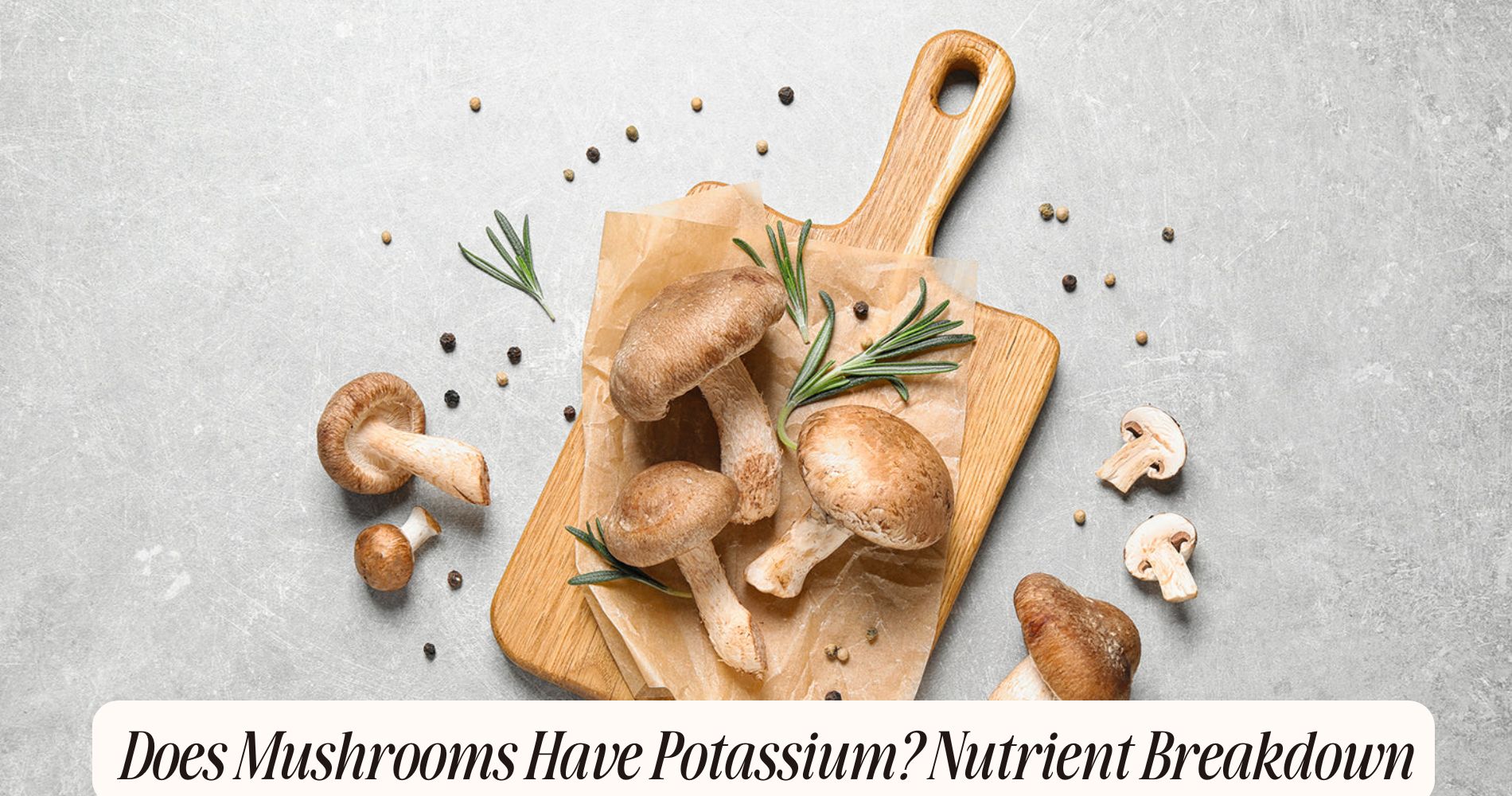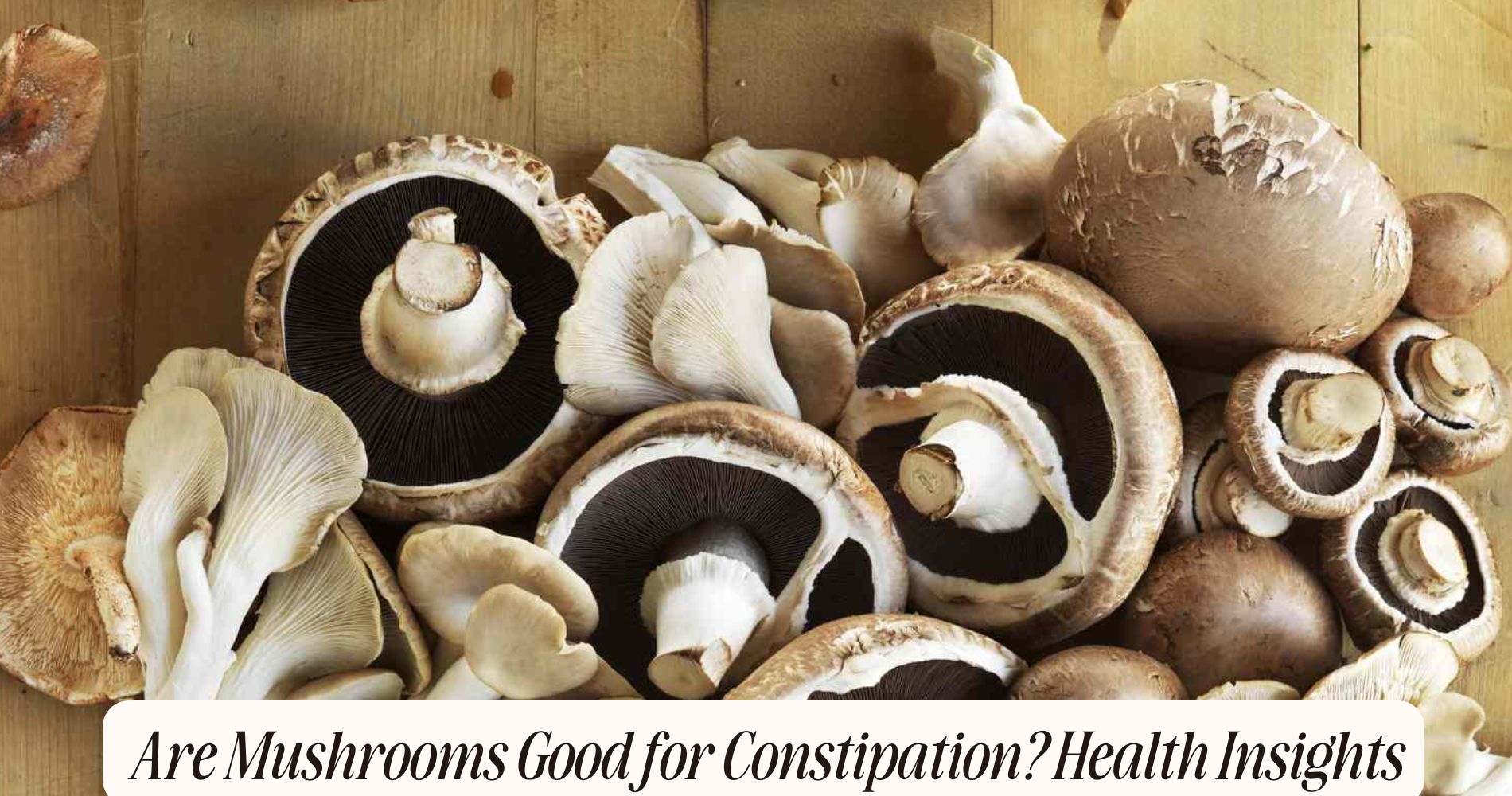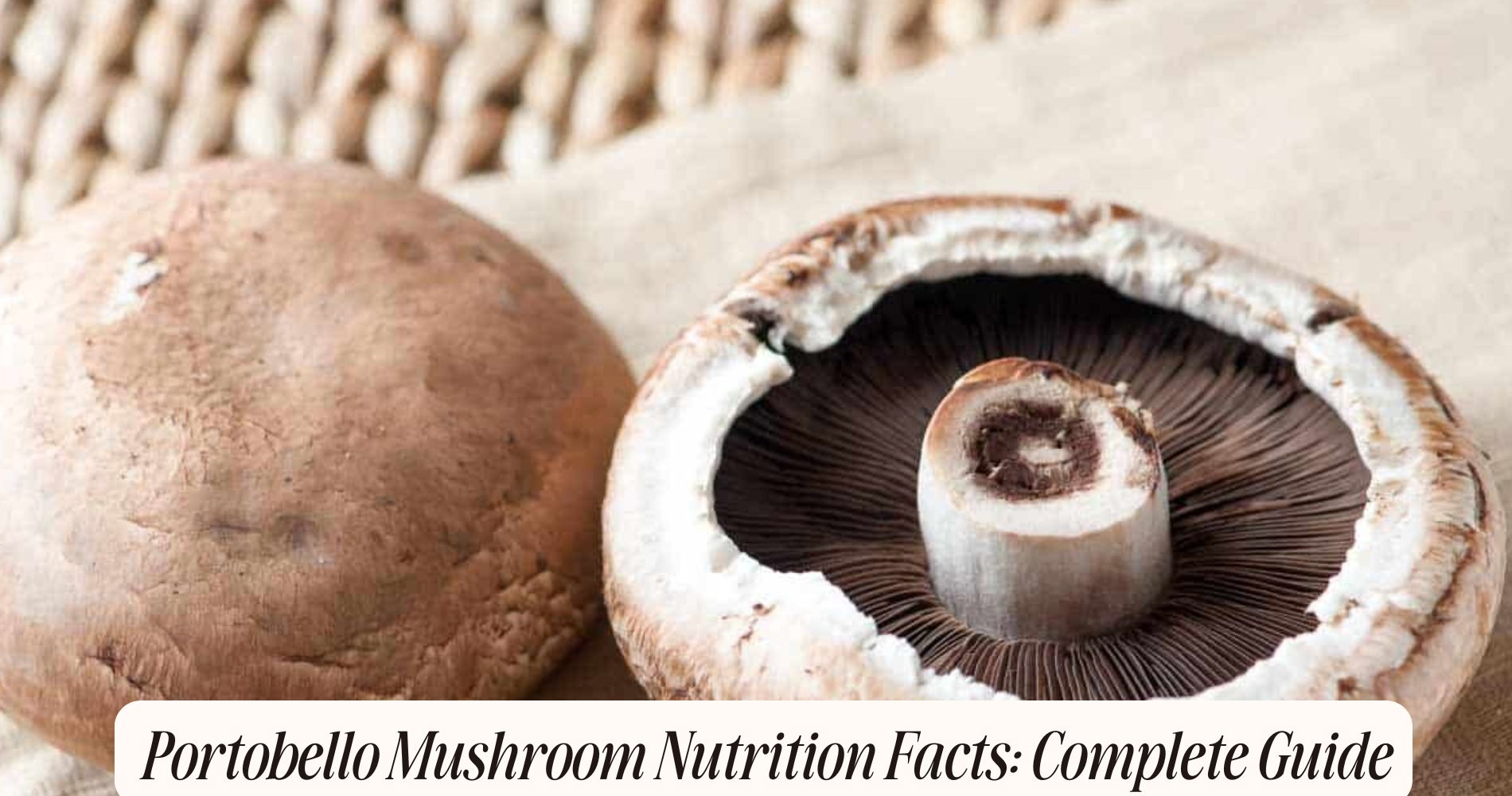
Does Mushrooms Have Potassium? Nutrient Breakdown
Does mushrooms have potassium? Yes, mushrooms do have potassium and can greatly contribute to your daily intake. For instance, cooked portobello mushrooms contain around 425 mg of potassium per cup, while cooked shiitake mushrooms provide about 300 mg. This places mushrooms among other potassium-rich foods like bananas and sweet potatoes. Not only are they a good source of potassium, but they're also packed with vitamins, minerals, and antioxidants. Cooking methods can affect their nutrient retention, so choosing the right technique is essential for maximizing these benefits. If you'd like to know more about how to incorporate mushrooms into your diet, keep exploring!
What Is Potassium?
Potassium plays an essential role in maintaining your body's overall health. This significant mineral is critical for various bodily functions, including regulating fluid balance, nerve transmission, and muscle contraction. Without adequate potassium, you might experience issues like muscle cramps, fatigue, and even heart problems.
You can find potassium in a variety of foods, making it relatively easy to meet your daily requirements. Some excellent potassium sources include bananas, oranges, potatoes, spinach, and legumes. Incorporating these foods into your diet can help you maintain ideal potassium levels and support your body's functions.
One of the primary potassium functions is its role in maintaining healthy blood pressure. It helps counteract the effects of sodium, promoting better cardiovascular health. Additionally, potassium aids in the proper functioning of your cells, ensuring they operate efficiently.
To keep your potassium levels in check, aim for a balanced diet rich in fruits, vegetables, and whole grains. This not only supports your potassium intake but also contributes to your overall nutrition.
Potassium in Mushrooms
Mushrooms can be an excellent addition to your diet if you're looking to boost your potassium intake. Various mushroom varieties, such as portobello, shiitake, and white button mushrooms, are particularly rich in potassium.
For instance, a cup of cooked shiitake mushrooms provides roughly 400 mg of potassium, which is about 11% of the daily recommended intake.
Incorporating mushrooms into your meals is simple, thanks to versatile cooking techniques. You can sauté them, grill them, or toss them into soups and salads.

Each method not only enhances the flavor but also preserves their nutrient content, including potassium.
When you're focused on getting more potassium, consider pairing mushrooms with other potassium-rich foods like sweet potatoes or spinach.
This combination can create a delicious and nutritious dish that supports your dietary goals.
Nutrient Profile of Mushrooms
Mushrooms are packed with essential nutrients that can boost your health.
You'll find vitamins, minerals, and antioxidants that offer numerous benefits, making them a powerful addition to your diet.
When you compare mushrooms to other foods, their unique nutrient profile stands out, highlighting their value in promoting overall wellness.
Key Nutrients Found
A variety of essential nutrients can be found in mushrooms, making them a valuable addition to your diet. Different mushroom varieties, such as shiitake, portobello, and button mushrooms, offer unique nutrient profiles, enhancing their appeal.
One of the standout features of mushrooms is their impressive nutrient density. They're low in calories but packed with vitamins and minerals.
Mushrooms are an excellent source of B vitamins, including riboflavin, niacin, and pantothenic acid, which play significant roles in energy metabolism. They also provide important minerals like selenium, copper, and potassium. While potassium levels can vary among mushroom varieties, they generally contribute to your daily intake, supporting heart health and proper muscle function.
Additionally, mushrooms contain antioxidants, such as ergothioneine and glutathione, which can help combat oxidative stress in your body. The fiber content in mushrooms promotes digestive health, making them a well-rounded food choice.
Health Benefits Overview
Incorporating mushrooms into your diet not only enhances flavor but also delivers a range of health benefits thanks to their rich nutrient profile. These versatile fungi are low in calories yet packed with essential vitamins and minerals, making them an excellent addition to any meal.
Different mushroom varieties, such as shiitake, portobello, and button mushrooms, each offer unique health benefits. For instance, shiitake mushrooms are known for their immune-boosting properties, while portobello mushrooms are a great source of fiber.

One of the standout nutrients in mushrooms is potassium, a crucial mineral that helps regulate blood pressure and supports heart health.
While many people may think of bananas as the go-to potassium sources, mushrooms can also contribute considerably to your daily intake. A serving of certain mushroom varieties can provide a substantial amount of this essential nutrient, helping you maintain a balanced diet.
Comparison With Other Foods
When comparing the nutrient profile of mushrooms to other common foods, you'll find that these fungi are surprisingly rich in essential nutrients. Different mushroom varieties, such as shiitake, portobello, and white button mushrooms, each offer unique health benefits while contributing to your daily potassium intake.
Mushrooms contain about 300-400 mg of potassium per 100 grams, making them a valuable potassium source. This level is comparable to some fruits and vegetables, like bananas and sweet potatoes, which are often touted as top potassium-rich foods.
However, mushrooms provide additional nutrients, including B vitamins, selenium, and antioxidants, which enhance their overall health impact. In contrast, while bananas offer around 400-450 mg of potassium per 100 grams, they lack the diverse nutrient profile found in mushrooms.
Incorporating a mix of mushroom varieties into your diet can help you meet your potassium needs while also benefiting from their unique vitamins and minerals. So, don't overlook mushrooms in your quest for a nutritious diet—they're a versatile addition that can elevate your meals and boost your health.
Types of Mushrooms and Their Nutrients
Mushrooms offer a diverse array of types, each packed with unique nutrients that can benefit your health. From common varieties like button and portobello to more exotic types like shiitake and maitake, these mushrooms vary greatly in their nutrient density.
For instance, shiitake mushrooms are particularly high in B vitamins, while portobellos provide a good amount of selenium and dietary fiber.
Button mushrooms, the most widely consumed, are low in calories but rich in potassium, making them a great choice for maintaining healthy blood pressure levels. On the other hand, enoki mushrooms boast a high level of antioxidants, which help combat oxidative stress.
Mushroom varieties also differ in their vitamin D content, especially when exposed to UV light, which enhances their nutrient profile. Additionally, many mushrooms are low in fat and cholesterol-free, making them an excellent choice for heart health.
Incorporating a variety of mushrooms into your diet not only adds flavor but also boosts your intake of important vitamins and minerals, enhancing overall health and well-being.
Health Benefits of Potassium
Potassium plays an essential role in maintaining ideal health, supporting everything from nerve function to muscle contraction. This important mineral helps regulate fluid balance, ensuring your cells function properly. When you consume adequate potassium sources, like bananas, sweet potatoes, and, yes, mushrooms, you help your body maintain healthy blood pressure levels.

A diet rich in potassium can lower the risk of stroke, kidney stones, and osteoporosis. It also aids in muscle recovery after exercise, as potassium helps transport nutrients to your cells.
If you're not getting enough potassium, you might experience potassium deficiency, which can lead to symptoms like fatigue, muscle weakness, and irregular heart rhythms.
To avoid these negative effects, aim for the recommended daily intake of potassium, which is about 2,500 to 3,000 mg for adults. Incorporating potassium-rich foods into your meals is an effective way to meet this goal.
Comparing Mushrooms to Other Foods
While many foods are rich in potassium, mushrooms often get overlooked in discussions about dietary sources. When you compare different mushroom varieties, you'll find that they pack a surprising potassium punch. For instance, a cup of cooked portobello mushrooms contains about 425 mg of potassium, while a similar serving of cooked shiitake mushrooms offers around 300 mg. This positions them as excellent, plant-based potassium sources.
In comparison, bananas, often touted for their potassium content, contain about 422 mg per medium fruit. Sweet potatoes and spinach are also high in potassium, with sweet potatoes providing about 541 mg per medium-sized potato.
However, mushrooms have the added benefit of being low in calories and high in other nutrients, making them a versatile addition to your diet.
Using mushrooms alongside these other potassium-rich foods can help you meet your daily intake goals without the added calories. So, next time you're planning a meal, consider incorporating various mushroom varieties to boost your potassium levels while enjoying a delicious and nutritious dish.
Cooking Methods and Nutrient Retention
When it comes to cooking mushrooms, the method you choose can greatly impact their nutrient retention, including potassium levels. Different cooking techniques can lead to varying degrees of nutrient loss.
For instance, boiling mushrooms can cause significant potassium loss because the nutrients leach into the water. If you're looking to maximize potassium intake, consider sautéing or grilling instead. These methods use higher heat for a shorter time, which helps preserve the nutrients.
Steaming is another effective technique, as it retains moisture without submerging the mushrooms in water, minimizing nutrient loss. When you cook mushrooms, try to avoid prolonged cooking times at high temperatures, as these can break down nutrients, including potassium.
Additionally, using minimal oil and seasoning can help keep the focus on the mushrooms themselves, allowing you to enjoy their natural flavor and nutrients.
Always remember that fresh mushrooms are generally more nutrient-dense, so opt for fresh rather than canned or processed versions when possible. By choosing the right cooking methods, you can enjoy the full benefits of mushrooms, ensuring you get the potassium and other nutrients they offer.
Daily Potassium Requirements
Understanding your daily potassium requirements is crucial for maintaining ideal health. The recommended dietary allowance (RDA) for potassium is about 2,500 to 3,000 mg for adults, depending on factors like age, gender, and activity level. Potassium plays an essential role in various bodily functions, including muscle contractions, nerve signals, and fluid balance.
To meet your potassium needs, focus on incorporating a variety of potassium sources into your diet. Fruits and vegetables, such as bananas, oranges, and spinach, are excellent choices. Additionally, legumes, nuts, and whole grains can further boost your potassium intake. Mushrooms also contribute to your daily potassium needs, making them a valuable addition to your meals.

Failing to consume enough potassium can lead to potassium deficiency, which may result in symptoms like muscle weakness, fatigue, and irregular heart rhythms.
If you're concerned about your potassium intake or suspect you may be deficient, consider consulting a healthcare professional. They can help you assess your diet and recommend appropriate changes to guarantee you're meeting your potassium requirements for peak health.
Incorporating Mushrooms Into Your Diet
Incorporating mushrooms into your diet can be a delicious and nutritious way to boost your potassium intake. These versatile fungi can easily fit into various meals, enhancing flavor and texture while providing essential nutrients. Start by exploring simple mushroom recipes that include sautéed mushrooms in omelets, stir-fries, or pasta dishes. Not only do they add depth to your meals, but they also contribute valuable potassium.
When incorporating mushrooms, consider dietary tips like using a mix of different types, such as shiitake, portobello, and cremini. Each variety offers unique flavors and nutritional benefits. You can also try adding mushrooms to soups, salads, and sandwiches for an extra nutritional punch.
For a quick snack, consider roasting or grilling mushrooms with a drizzle of olive oil and your favorite herbs. This method brings out their natural umami flavor, making them an appealing addition to your diet.
Don't forget to experiment with mushroom-based sauces or spreads, which can be a healthy alternative to traditional condiments. By regularly including mushrooms in your meals, you'll not only enjoy their delicious taste but also support your potassium intake effectively.
Boost Your Wellness with SUPER MUSHROOM GUMMIES
Looking for an easy way to enjoy the benefits of mushrooms? SUPER MUSHROOM GUMMIES from Well Gummies offer a convenient and delicious option. These vegan gum chews are packed with 10 functional mushrooms, to naturally fuel your brain, energize your body, and provide immune support. With a delicious wild berry flavor, these gummies deliver calmer energy and sharper focus—without jitters or crashes. Get the benefits of mushrooms, including key nutrients like potassium, in a tasty and convenient form that fits effortlessly into your daily routine.
Frequently Asked Questions
Are There Any Side Effects of Consuming Too Much Potassium From Mushrooms?
Consuming too much potassium can lead to potassium toxicity, which may cause heart issues or muscle weakness. It's essential to maintain a dietary balance, so be mindful of your total potassium intake from all sources, including mushrooms.
Can Mushrooms Help With Potassium Deficiency Symptoms?
Mushrooms can help alleviate potassium deficiency symptoms due to their nutrient profile. Their benefits include enhancing potassium absorption, supporting overall health, and potentially improving muscle function and heart health when included in a balanced diet.
Do Different Mushroom Species Have Varying Potassium Levels?
Yes, different mushroom varieties do have varying potassium concentrations. For instance, shiitake mushrooms typically contain more potassium than white button mushrooms. Incorporating diverse types into your diet can help you achieve better potassium intake.
How Do Mushrooms Compare to Bananas in Potassium Content?
Mushroom varieties generally contain less potassium than bananas. While bananas are excellent dietary sources of potassium, mushrooms offer unique flavors and nutrients, making them valuable additions to your meals, though they won't match bananas' potassium levels.
Can Cooking Methods Affect Potassium Levels in Mushrooms?
Yes, cooking techniques can affect potassium levels in mushrooms. Methods like steaming or sautéing often promote nutrient retention better than boiling, which may leach potassium into the water, reducing the overall nutrient content you consume.
Conclusion
Incorporating mushrooms into your diet is a tasty way to boost your potassium intake. Not only do they provide essential nutrients, but they also offer various health benefits. With different types of mushrooms available, you can easily find options that fit your taste and nutritional needs. Remember to explore cooking methods that retain their nutrients to maximize their benefits. So, enjoy mushrooms as a versatile ingredient in your meals and support your overall health!




